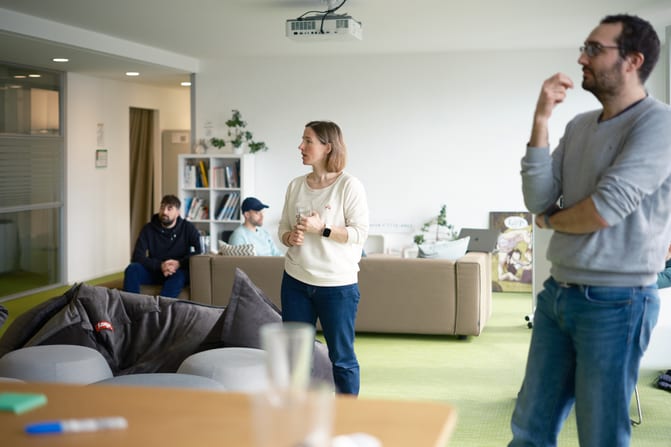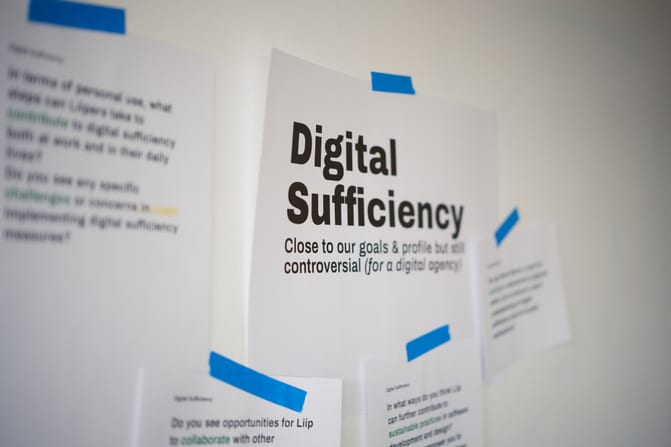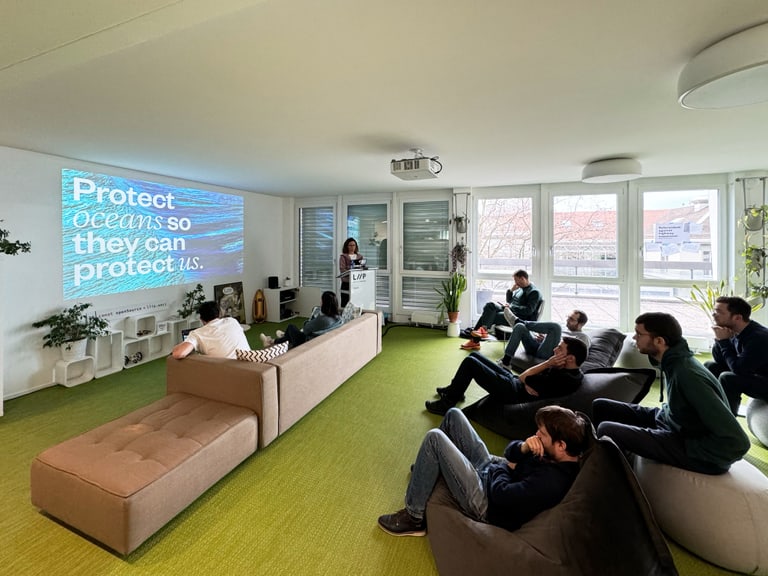Since 2022, we've been organising Sustainability Lunches. As the name suggests, these gatherings provide an opportunity to discuss sustainability having lunch together. We initially began with sessions involving a film or TED Talk as a starter for discussions.
To delve deeper and draw inspiration, we've recently invited external speakers. We want to learn from organisations with a strong purpose. We've had the pleasure of hosting Gebana to discuss local and sustainable agriculture, Beelong and their Eco-Score for measuring the sustainability of food products, and Your2040, an association aiming to envision and create a sustainable future.
Patagonia and Corporate Political Activism
The most recent Sustainability Lunch featured Vanessa Rueber from Patagonia at our Lausanne office. Vanessa briefly introduced the history of the renowned brand, a reference for corporate responsibility in our eyes. She gave us an overview of the foundation's commitment, which donates $70 million annually to NGOs and supports around 30 initiatives. Their current campaign focuses on ocean protection, specifically combating overfishing and seabed destruction from bottom trawling. The global campaign includes a European component with various videos and a petition to the European Parliament, already signed by over 140,000 people.
Our Political Engagement
Our potential political engagement has been a subject of consideration, notably during a workshop at our Liip Conf 2023. It’s an ongoing debate and we consider it as a journey to finding our voice in this field. We've also taken some actions, including financial support for the Glacier Initiative, support for the Climate Act in 2023, and calls to vote without endorsing any specific party. As you may already know, we have Gerhard Andrey, a Green Party National Councillor, among us, who was also a candidate for the Federal Council in late 2023.
During the Sustainability Lunch, we wanted to move on the results from the workshop and become more specific. Discussions were held across our different locations, based on three potential activism scenarios, covering topics more or less related to our core business: AI regulation, expansion of the Swiss highway network and Digital Sufficency. Indeed, a point of debate regarding corporate activism is the choice of themes and the legitimacy of addressing them as a company.
Expertise and Legitimacy of Corporate Political Activism
Some believe that we add more value by focusing our engagement on political terrains where we have expertise. As a result, Digital Sufficency was the topic being discussed lively at some locations. Digital Sufficiency is a pillar of digital sustainability directly related to software and hardware. This is an area in which we possess expertise and intend to become more active on a practical level.

The topic of digital sustainability directly concerns our activities in developing and designing digital solutions, not to mention aspects regarding their hosting. We are actively involved in the development of the W3C Web Sustainability Guidelines, demonstrating how to design and implement digital services and products with the planet in mind. We are also part of the community group further developing the guidelines.

Digital sustainability particularly concerns software in our case, without neglecting the issue of hardware consumption. As a digital agency, we are mindful not to overconsume at this level. We financially incentivise Liipers to use only one laptop for personal and professional use. One idea we've proposed is to encourage the purchase of second-hand computers rather than new ones for workstations where new computers are not required.
Another potential political topic discussed is the expansion of the Swiss highway network, which will soon be voted on. It is a subject that concerns us all, albeit not directly related to our activities. This sparked debates between those who believe we should be proactive and those who don't think it's our place to intervene. Indeed, a more pronounced political engagement implies being more visible and subject to criticism, including on social media. A proposed communication strategy would simply highlight what we're doing to promote sustainable mobility. This to show that professional car travel is not inevitable, and having more impact by doing so than by telling what to vote.
Like previous Sustainability Lunches, we were inspired and engaged in discussions on this important sustainability theme over a good meal.

